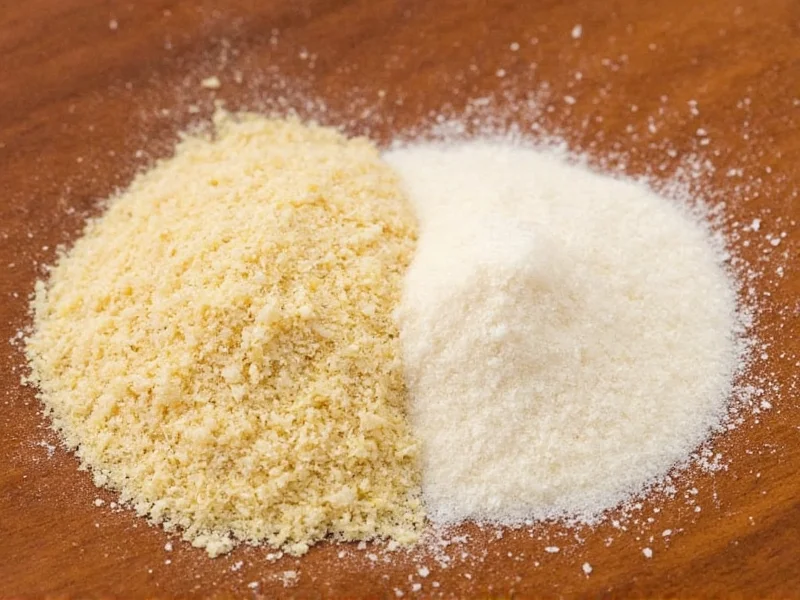When you're standing in the spice aisle or following a recipe that calls for one form of dried garlic, knowing the distinction between granulated garlic and garlic powder can make or break your dish. These two common pantry staples often get confused, but their physical properties lead to different performance in cooking.
Physical Differences Between Granulated Garlic and Garlic Powder
The most obvious difference lies in their texture and particle size. Garlic powder undergoes additional processing to achieve a fine, flour-like consistency, while granulated garlic maintains a coarser texture with visible granules.
| Characteristic | Garlic Powder | Granulated Garlic |
|---|---|---|
| Particle Size | Fine, flour-like (0.1-0.3mm) | Coarse, sand-like (0.5-1.0mm) |
| Moisture Content | 4-6% | 6-8% |
| Production Process | Dehydrated, then finely ground | Dehydrated with minimal grinding |
| Shelf Life | 2-3 years | 1-2 years |
Flavor Profile Comparison
Garlic powder delivers a more concentrated garlic flavor because its finer particles have greater surface area, allowing flavors to release more quickly. This makes garlic powder approximately 20-25% stronger than granulated garlic by volume.
When considering can I substitute granulated garlic for garlic powder, remember that the moisture difference affects how they interact with other ingredients. Granulated garlic dissolves more slowly, making it better for dry rubs that need time to penetrate meat, while garlic powder integrates quickly into liquids and sauces.
Culinary Applications and Best Uses
Chefs select between these forms based on the specific requirements of their recipes. Understanding garlic powder vs granulated garlic conversion ratios prevents flavor imbalances in your cooking.
When to Use Garlic Powder
- For immediate flavor release in sauces, soups, and dressings
- When creating spice blends that need uniform consistency
- In baking applications where even distribution matters
- For recipes requiring quick dissolution in liquids
When to Use Granulated Garlic
- For dry rubs where texture helps adhere to meat surfaces
- In recipes where slower flavor release is desirable
- When making homemade garlic salt (better texture control)
- For applications where you want visible garlic specks
Substitution Guidelines: Getting the Ratio Right
When you need to make a substitution, understanding the garlic powder to granulated garlic conversion is crucial. The standard ratio is:
| Original Ingredient | Substitute | Conversion Ratio |
|---|---|---|
| Garlic Powder | Granulated Garlic | 1 tsp powder = 1¼ tsp granulated |
| Granulated Garlic | Garlic Powder | 1 tsp granulated = ¾ tsp powder |
| Fresh Garlic | Garlic Powder | 1 clove = ⅛ tsp powder |
| Fresh Garlic | Granulated Garlic | 1 clove = ¼ tsp granulated |
When substituting, consider the recipe's liquid content. In wet applications, you can use equal amounts, but in dry rubs or spice blends, adjust according to the conversion ratios above. The question of which is stronger garlic powder or granulated garlic has a clear answer: powder delivers more intense flavor per volume.
Storage Recommendations for Maximum Freshness
Both products degrade over time, but at different rates due to their physical properties. Proper storage extends their usability and maintains flavor quality.
Store both in airtight containers away from light, heat, and moisture. Garlic powder's finer texture makes it more susceptible to moisture absorption, while granulated garlic's slightly higher moisture content means it may clump more readily. For longest shelf life, keep them in dark glass containers in a cool pantry.
Check for freshness by aroma - both should have a strong, characteristic garlic scent. If the smell has diminished significantly or turned musty, it's time to replace your supply. Properly stored, garlic powder typically remains potent for 2-3 years, while granulated garlic maintains quality for 1-2 years.
Common Misconceptions Clarified
Many home cooks wonder is garlic salt the same as granulated garlic - it's not. Garlic salt contains additional salt (typically a 3:1 ratio of salt to garlic), making direct substitution problematic without adjusting other salt in your recipe.
Another frequent confusion involves minced garlic vs granulated garlic. Minced garlic refers to fresh, chopped garlic, while granulated is dehydrated. They're fundamentally different products with distinct uses.
When reading labels, watch for additives. Some commercial products contain anti-caking agents like calcium silicate or silicon dioxide, which don't affect flavor but may concern those seeking pure ingredients. For the most accurate best substitute for garlic powder in recipes, check whether your product contains these additives as they can affect substitution ratios slightly.
Practical Recipe Applications
Understanding these differences transforms your cooking results. In a tomato-based pasta sauce, garlic powder integrates seamlessly, while granulated might leave noticeable specks. For a dry spice rub on steak, granulated garlic provides better texture adherence and slower flavor release during cooking.
When making garlic bread, garlic powder creates a more uniform flavor distribution throughout the butter, while granulated provides pleasant textural contrast. For marinades, garlic powder dissolves immediately, while granulated takes time to rehydrate and release flavor.
The choice between these forms ultimately depends on your specific recipe requirements and desired texture outcome. Neither is inherently superior - they're simply different tools for different culinary purposes.











 浙公网安备
33010002000092号
浙公网安备
33010002000092号 浙B2-20120091-4
浙B2-20120091-4